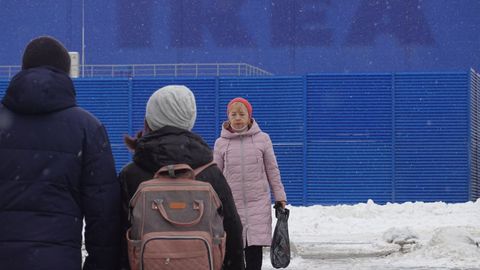
Russian citizens walk in front of the former Ikea store in Moscow MAKSIM ŠIPENKOV | EFE
The Russian economy is surviving drastic Western sanctions, but the Russians are suffering
From juice Initially after the invasion Ukrainethe Russian economy Until this January, he did not show any major complaints. The budget deficit exceeded 25,000 million dollars, a record number since 1998, when the country entered into a suspension of payments. Russia It continues to function relatively normally, but the instability of income from energy exports, excessive war spending and difficulties in procuring strategic materials are beginning to wear it down.
Despite everything, the country closed the year 2022 with the largest surplus in its history, of 227,000 million euros. In other words, sanctions don’t stop you from continuing to export, but they make it harder for you to get what you need. More precisely, exports from the EU fell by 35.6%, according to Eurostat data, but it Russian exports to the EU increased by 53.1 percent between March and December. According to a report prepared by the Free Russia Foundation, with data collected by Russian customs, in 2022 Russia will shift a large part of its energy exports to China and India and, while it will lose key suppliers such as Japan, the US or the UK, others such as Germany maintain an active trade.
The study focuses on strategic materials such as semiconductors and drones, the absence of which has seriously disrupted Russian activity, but which now enter through third countries through parallel imports. These are usually Turkey, Cyprus, the United Arab Emirates and China, which has become Russia’s main trading partner, replacing the EU as a source of high technology. And most importantly, despite the blockades, Russia still has access to large amounts of currency.
But normality is far away. For example, the logistics manager of a large Russian food company explains the difficulties last year: “Repairing juice packaging machines is a big problem, because we have to buy spare parts from third countries, and they are much more expensive; Every time we buy them, it’s like it’s the last,” explains WhatsApp. “Except, the raw materials we used to bring from Europe are no longer arriving.
The effects are reflected in food prices. “Bread and dairy products do not stop growing”, says AV, a university professor, on the phone. “They raised my salary by 10 percent, but I lost my purchasing power.” MA, a doctor from Moscow, explains: “We never eat salmon anymore and, in general, there is less supply and the quality is worse. Half of the shops in shopping centers are closed. In this sense, another young woman comments: “I don’t even know how expensive food is anymore… My normal face cream costs 1.5 times more, and the same goes for all medicines.” In addition, “the most authentic places, which cannot buy foreign products, are also closing,” he explains. “There are no branded clothes and although there are good Russian clothes, they are much more expensive,” adds AV
A sense of vulnerability is encouraged among retirees; up to a third say they can only afford the basics. Doctor MA says: “I don’t even know what to prescribe anymore, there are no more imported antibiotics, and the ones that are left are very expensive.”
There are also other significant indicators, such as a 63% drop in new car sales. “All the middlemen have left,” says the engineer from Moscow. “Repair and replacement of parts is not possible”, only with imitations. Of the four main brands, three are Russian and one is Chinese.
AV, the teacher, thinks: «Everything depends on the illusions you have. For many people, life just got more expensive. But if you aspire to something more, you have no perspective in Russia». For example, “there are fewer exhibitions and only Russian artists, the same with concerts and films,” he explains. “Publishers are closing due to lack of interest or censorship. It is much more difficult and expensive to get an education and to be in contact with the world. Finally, “it is unthinkable to study or teach at top foreign universities” and “travel is also very complicated without the usual intermediaries and almost unaffordable”.
Source: La Vozde Galicia
I am Amelia James, a passionate journalist with a deep-rooted interest in current affairs. I have more than five years of experience in the media industry, working both as an author and editor for 24 Instant News. My main focus lies in international news, particularly regional conflicts and political issues around the world.







